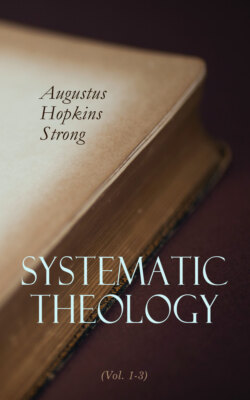Читать книгу Systematic Theology (Vol. 1-3) - Augustus Hopkins Strong - Страница 102
На сайте Литреса книга снята с продажи.
10. Acknowledgment of the non-inspiration of Scripture teachers and their writings.
ОглавлениеThis charge rests mainly upon the misinterpretation of two particular passages:
(a) Acts 23:5 (“I wist not, brethren, that he was the high priest”) may be explained either as the language of indignant irony: “I would not recognize such a man as high priest”; or, more naturally, an actual confession of personal ignorance and fallibility, which does not affect the inspiration of any of Paul's final teachings or writings.
Of a more reprehensible sort was Peter's dissimulation at Antioch, or practical disavowal of his convictions by separating or withdrawing himself from the Gentile Christians (Gal. 2:11–13). Here was no public teaching, but the influence of private example. But neither in this case, nor in that mentioned above, did God suffer the error to be a final one. Through the agency of Paul, the Holy Spirit set the matter right.
(b) 1 Cor. 7:12, 10 (“I, not the Lord”; “not I, but the Lord”). Here the contrast is not between the apostle inspired and the apostle uninspired, but between the apostle's words and an actual saying of our Lord, as in Mat. 5:32; 19:3–10; Mark 10:11; Luke 16:18 (Stanley on Corinthians). The expressions may be paraphrased:—“With regard to this matter no express command was given by Christ before his ascension. As one inspired by Christ, however, I give you my command.”
Meyer on 1 Cor. 7:10—“Paul distinguishes, therefore, here and in verses 12, 25, not between his own and inspired commands, but between those which proceeded from his own (God-inspired) subjectivity and those which Christ himself supplied by his objective word.” “Paul knew from the living voice of tradition what commands Christ had given concerning divorce.” Or if it should be maintained that Paul here disclaims inspiration—a supposition contradicted by the following δοκῶ—“I think that I also have the Spirit of God” (verse 40)—it only proves a single exception to his inspiration, and since it is expressly mentioned, and mentioned only once, it implies the inspiration of all the rest of his writings. We might illustrate Paul's method, if this were the case, by the course of the New York Herald when it was first published. Other journals had stood by their own mistakes and had never been willing to acknowledge error. The Herald gained the confidence of the public by correcting every mistake of its reporters. The result was that, when there was no confession of error, the paper was regarded as absolutely trustworthy. So Paul's one acknowledgment of non-inspiration might imply that in all other cases his words had divine authority. On Authority in Religion, see Wilfred Ward, in Hibbert Journal, July, 1903:677–692.
